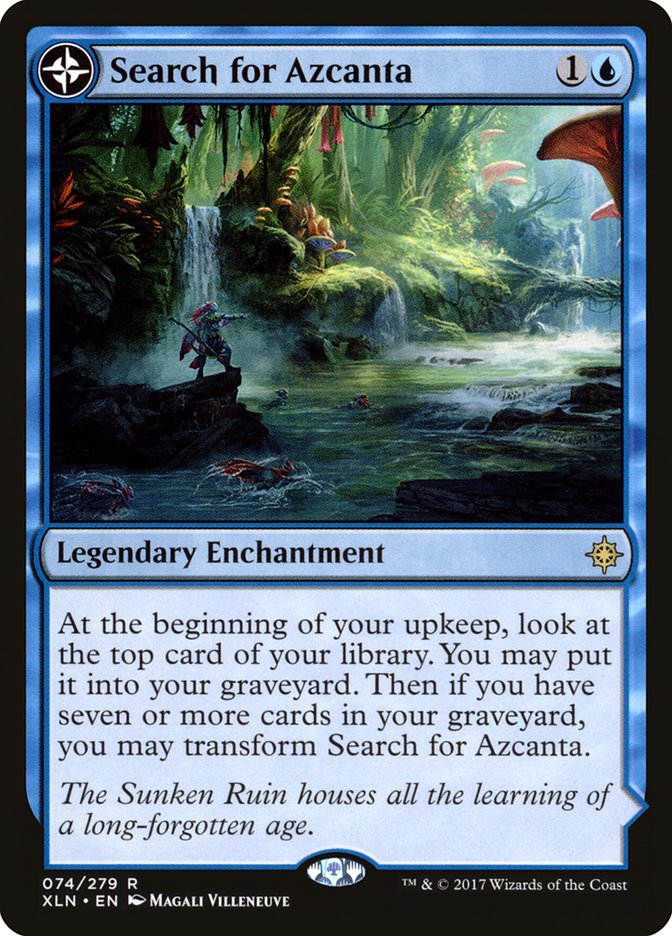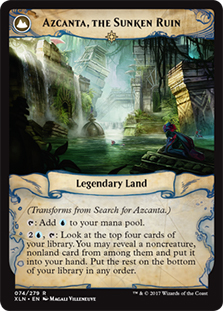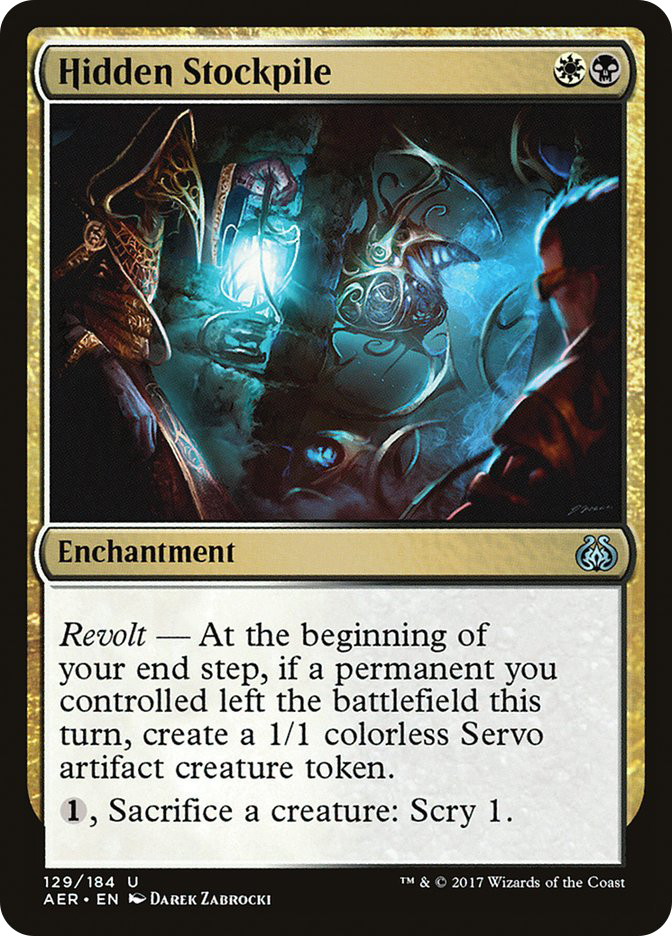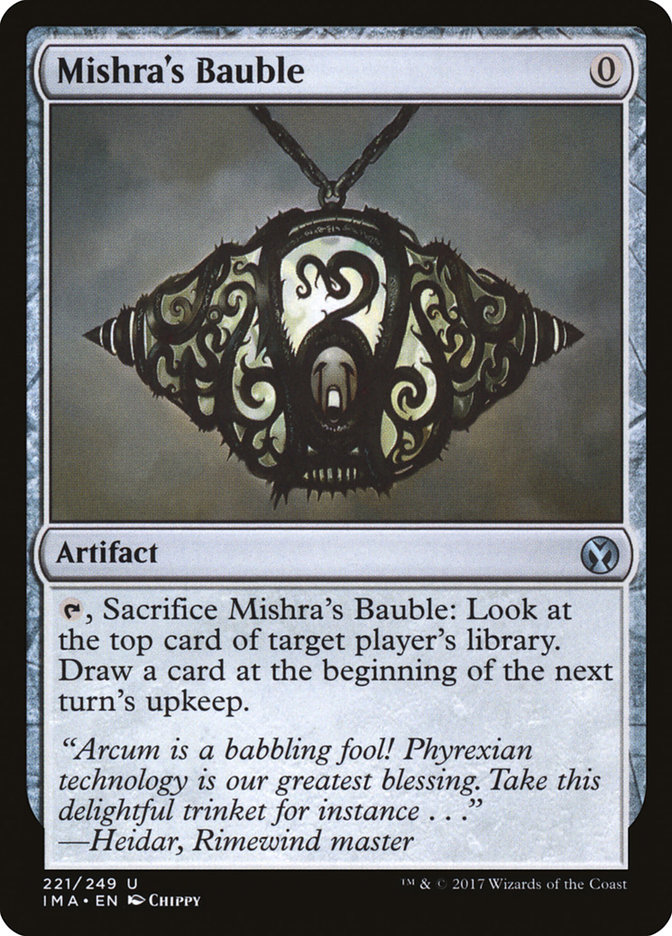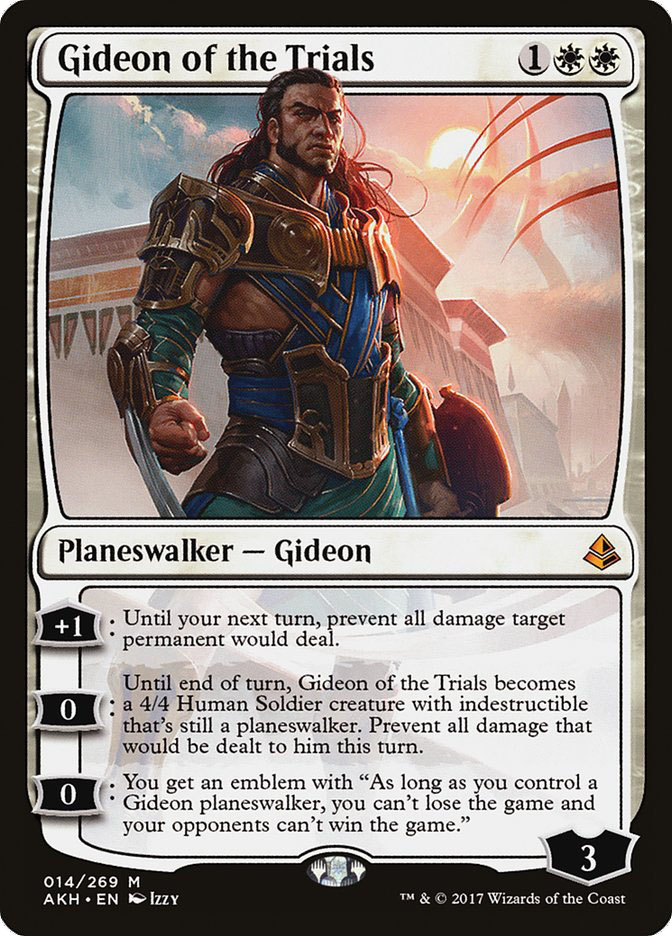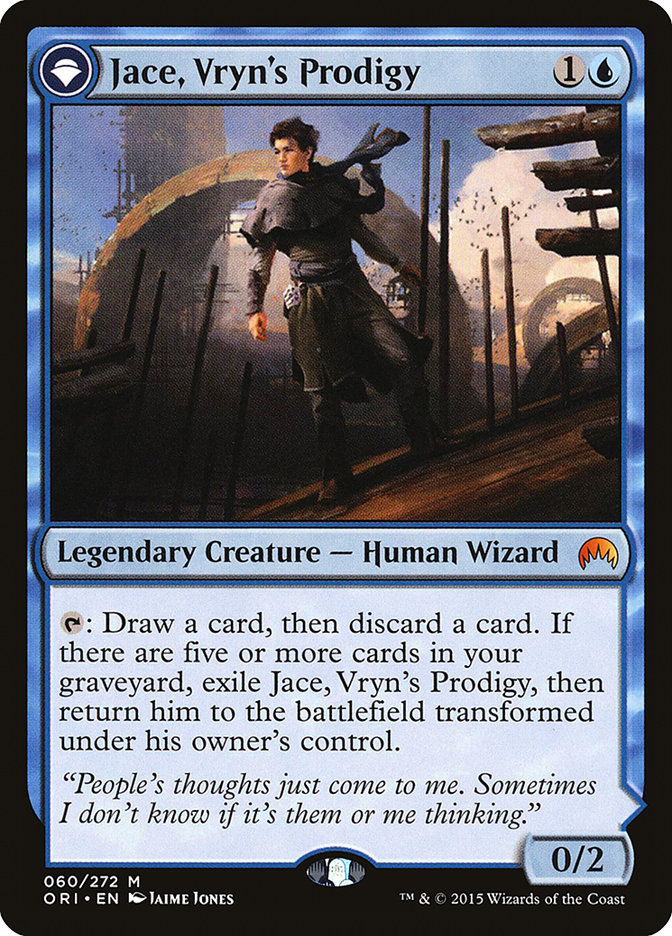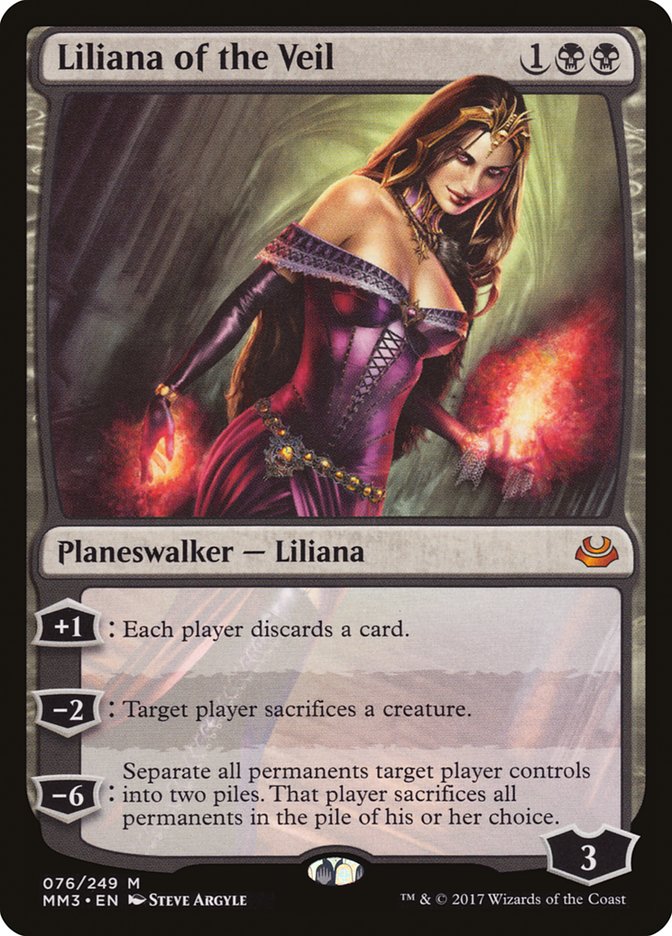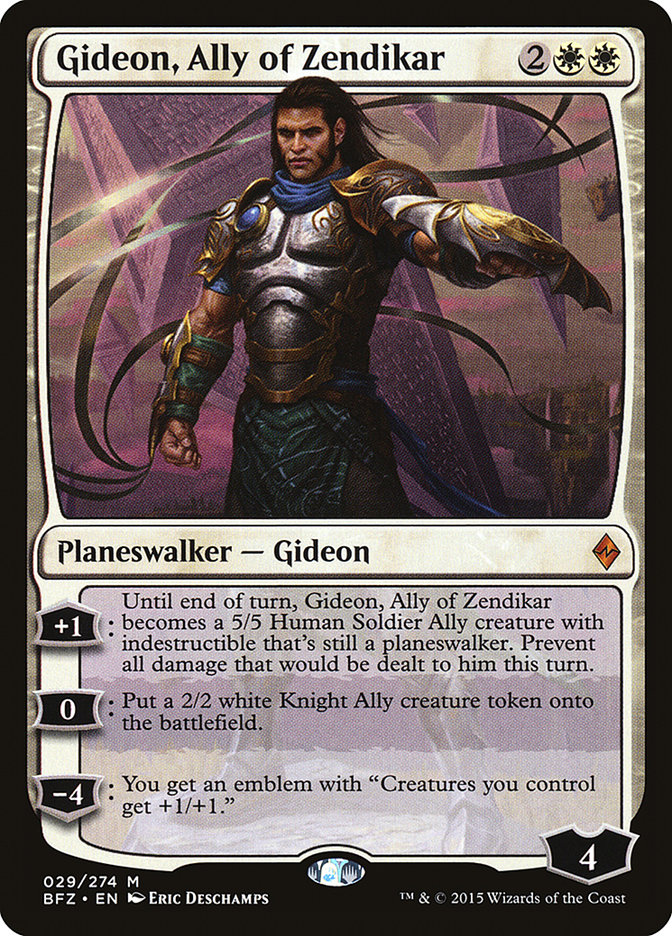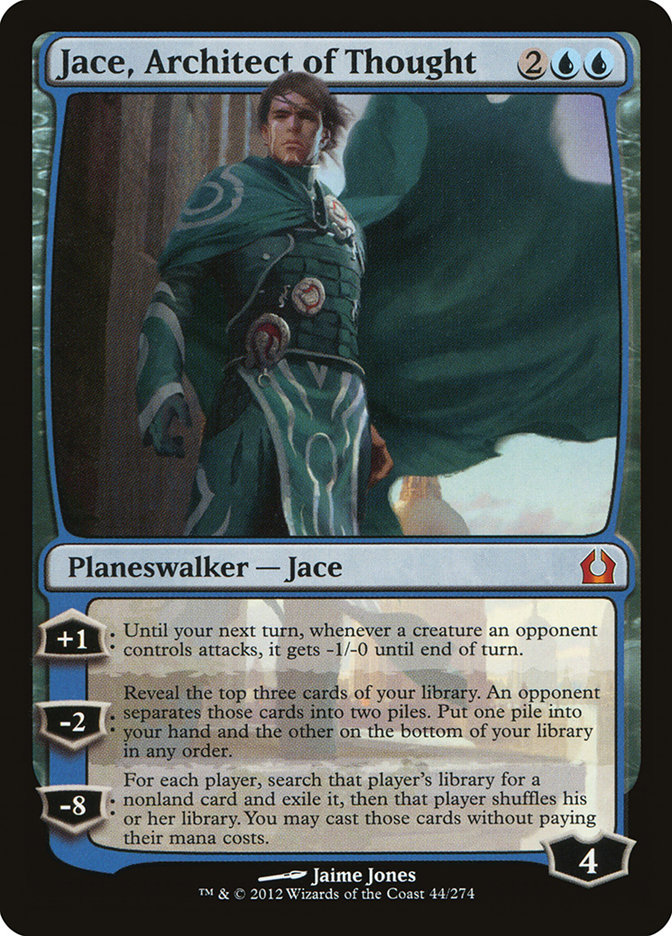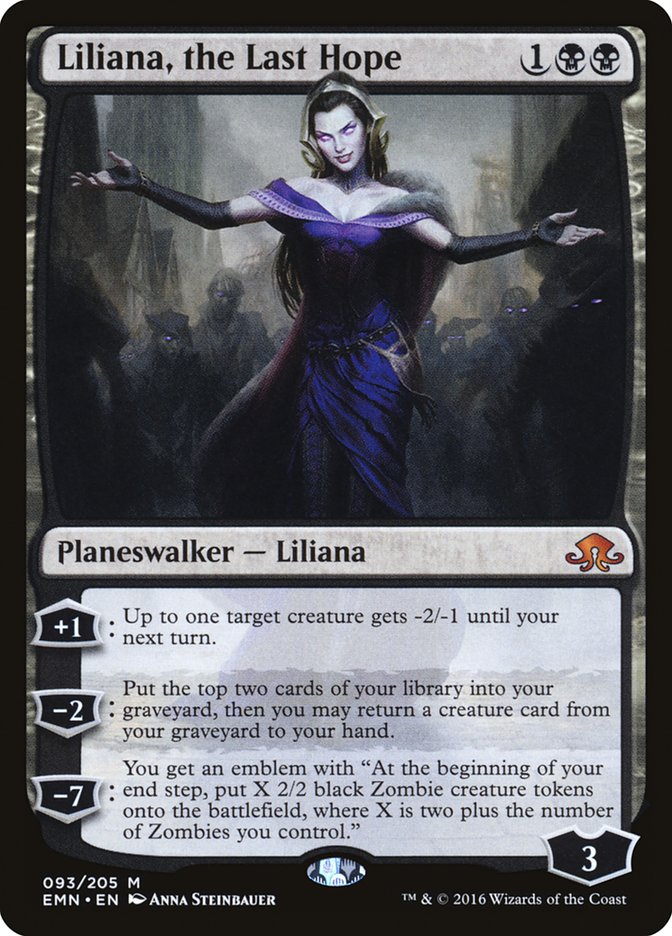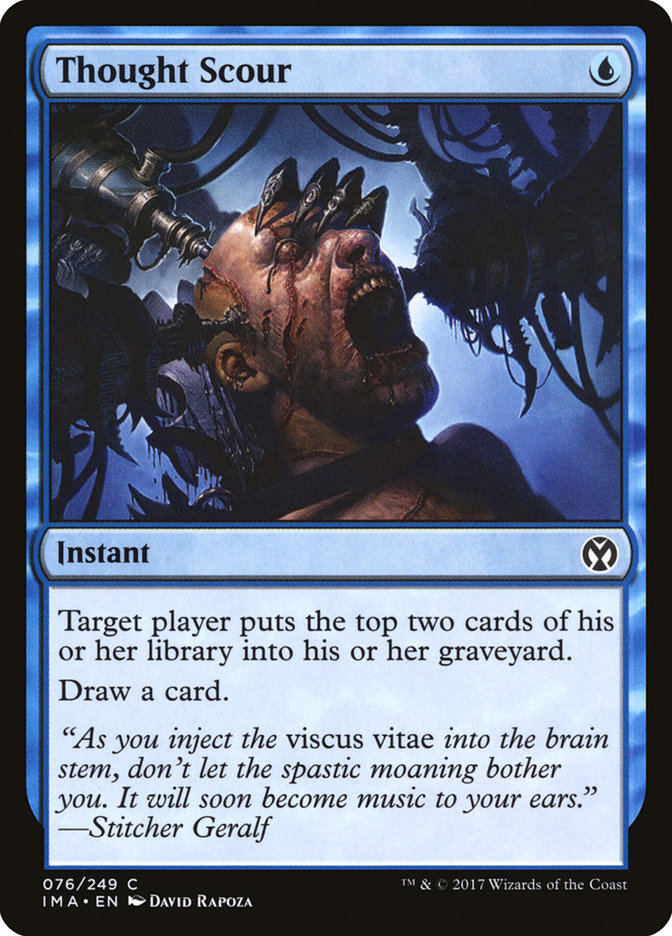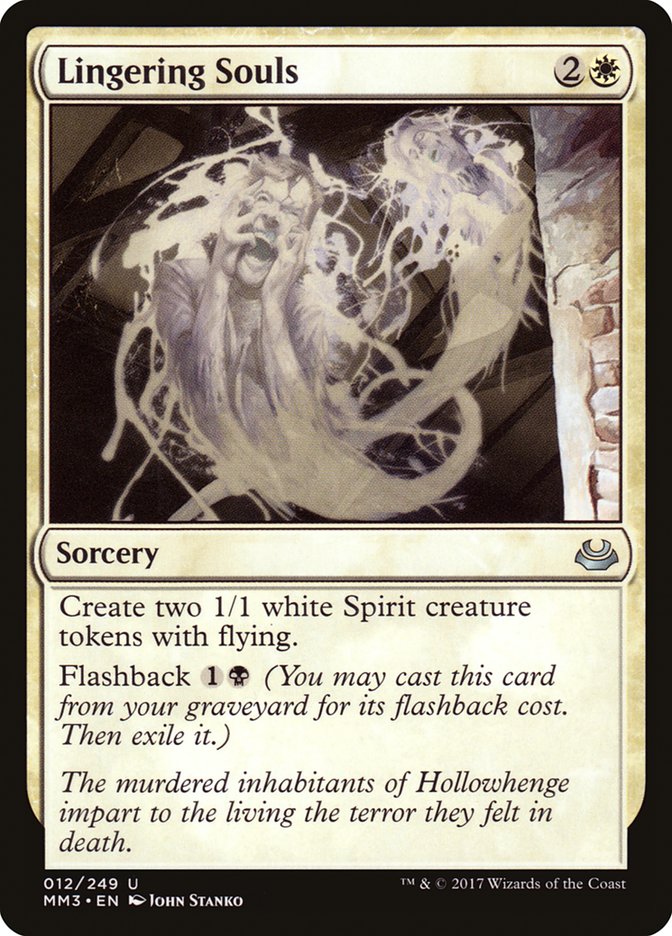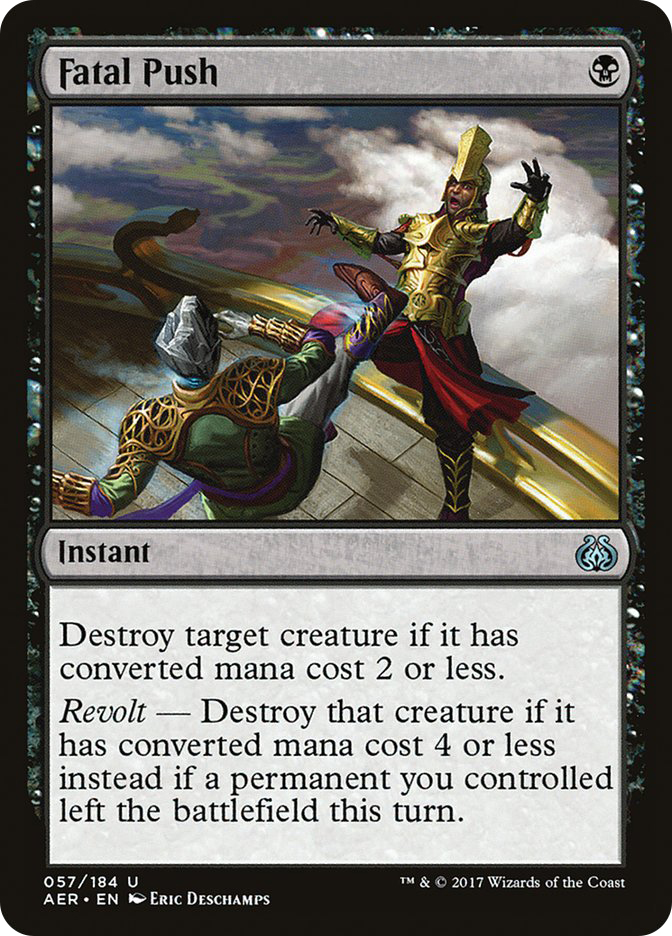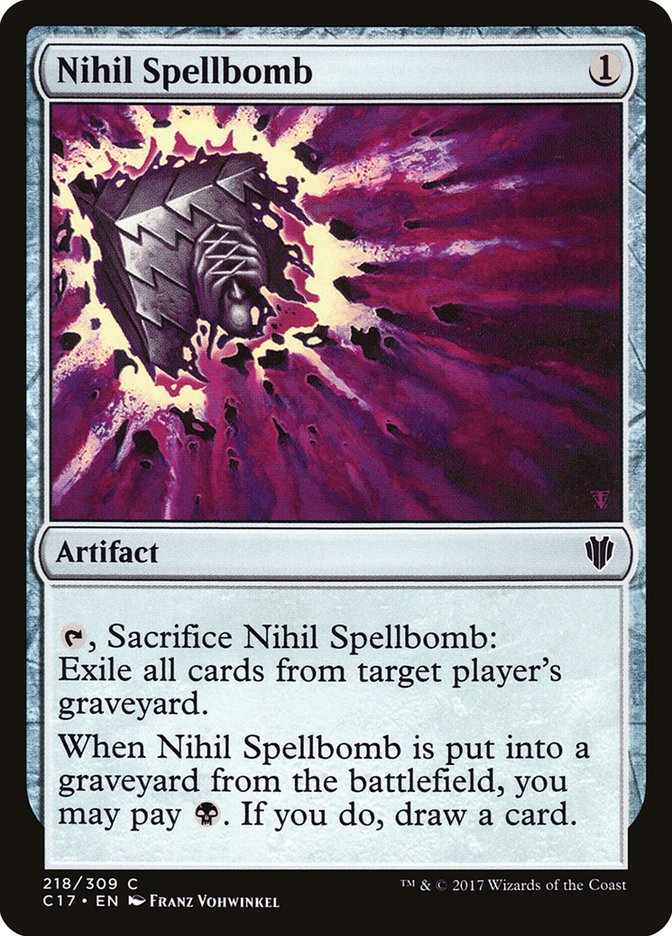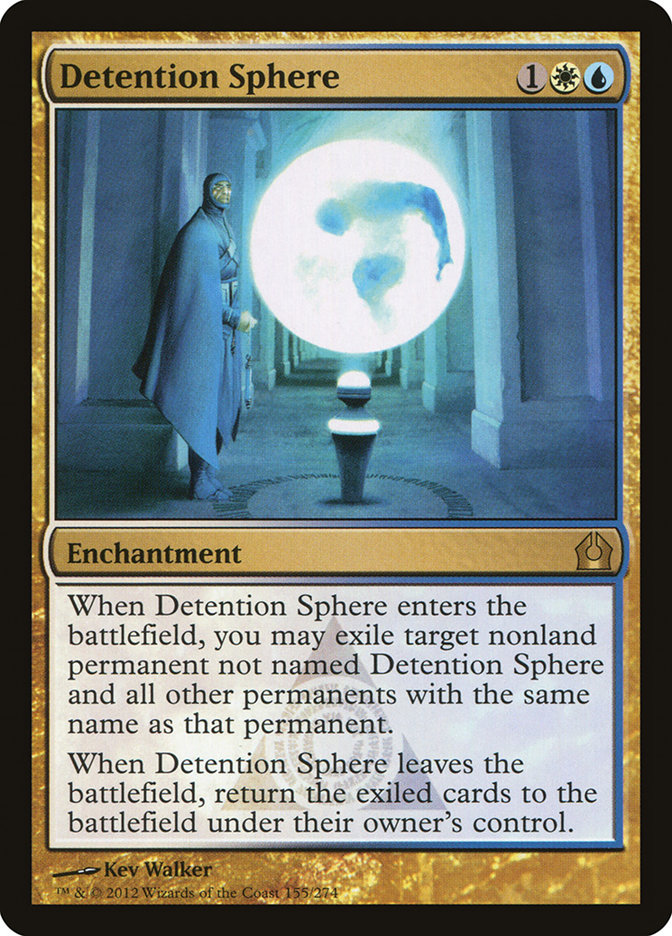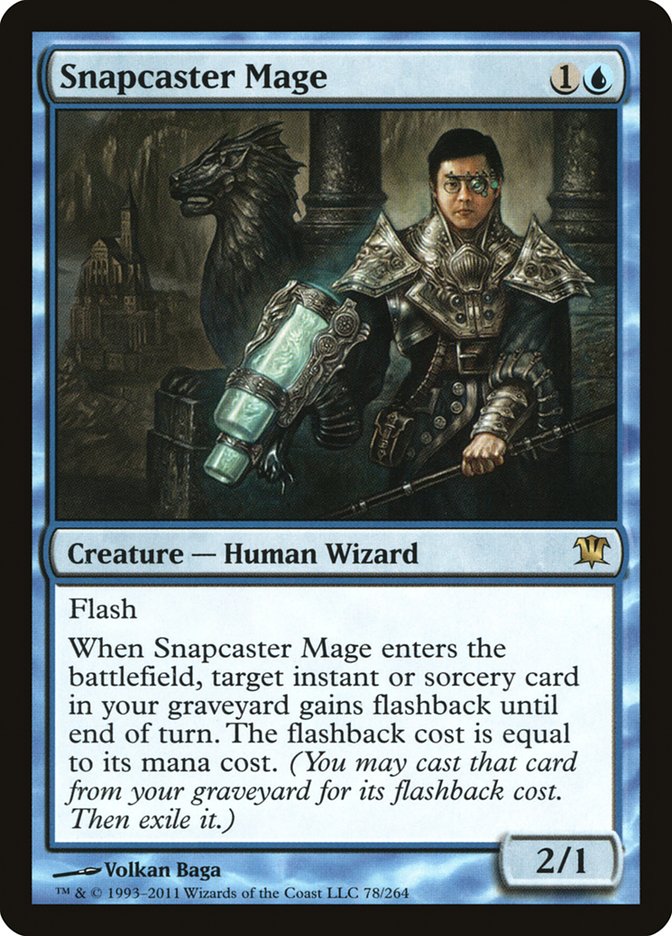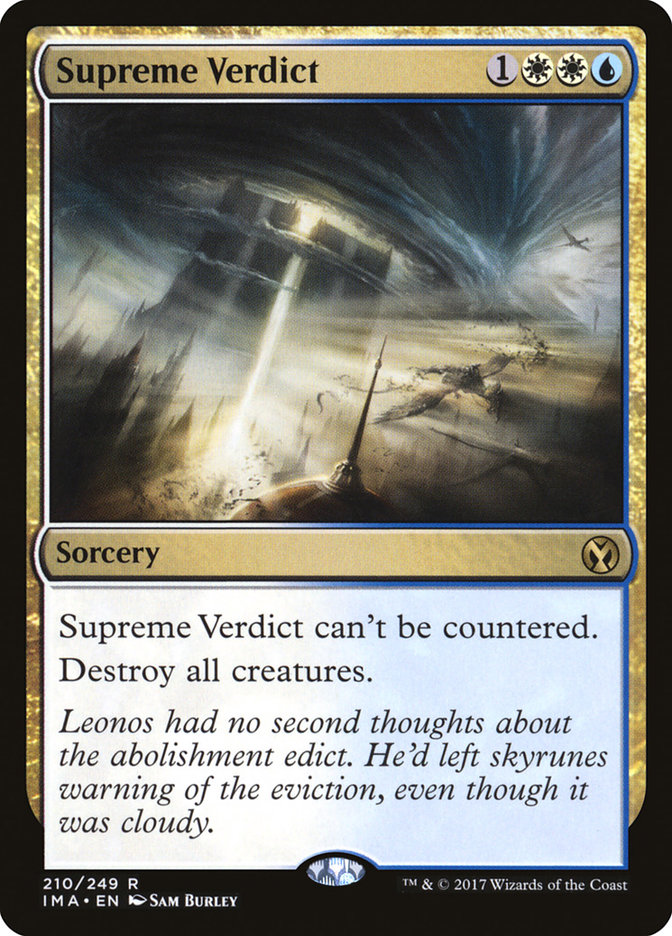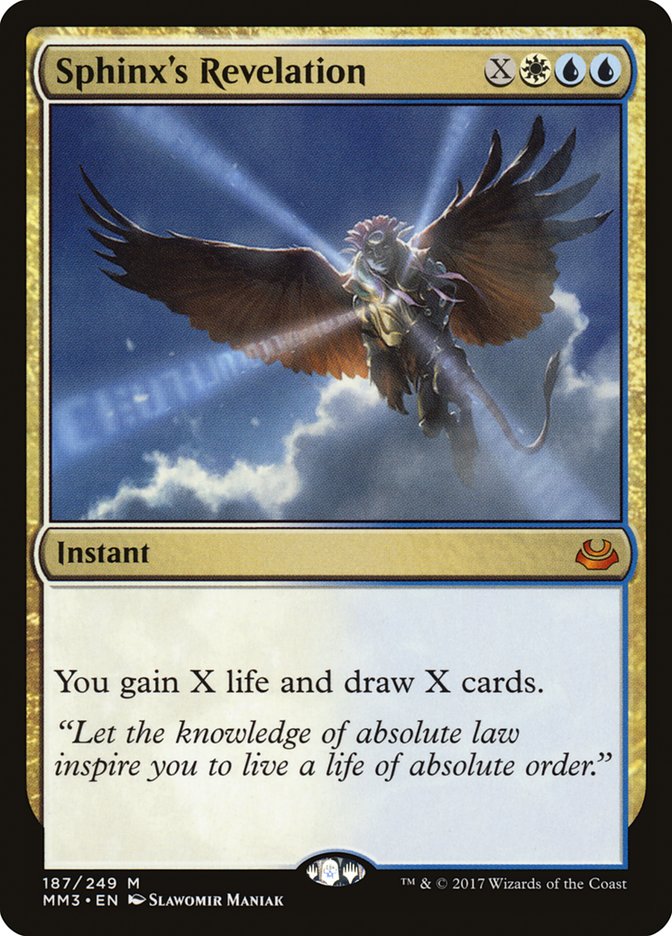Between Search for Azcanta and the new planeswalker uniqueness rule, things have recently gotten a lot better for hard control decks looking to extend the game beyond Turn 7 or so. I’ve read early reports that were disappointed with Search for Azcanta in Modern, but I’m still firmly a believer, despite the fact that it requires completely the opposite of what I usually recommend as an approach to Modern. I think the card is powerful enough to work for and that we simply haven’t learned how to build the best decks for it yet.
Another card that I firmly believe is good enough for Modern, but that I’m even further from finding the right home for, is Hidden Stockpile. Fetchlands by themselves certainly aren’t enough to trigger revolt every turn, but it’s easy to find other ways to trigger it, like Mishra’s Bauble or Nihil Spellbomb, and revolt triggers naturally a decent portion of the time from combat. If it triggers every turn, I think it’s a lot better than Bitterblossom. In exchange for flying, you get an extra creature the first turn, an extra life every turn, and the scry ability, which plays somewhat better than it looks in my experience.
Hidden Stockpile and Search for Azcanta are strategically similar to planeswalkers in that they’re cards that structurally want you to extend the game because they generate incremental value every turn. This means that both of these cards potentially benefit from the planeswalker rule change that allows you to have two differently named planeswalkers of the same type because there are greater incentives to create the shell that rewards that kind of gameplan, and then these complement the planeswalkers as a payoff for building the interactive shell that builds their kind of game.
Ultimately, Hidden Stockpile, Search for Azcanta, and basically any planeswalker are competing for space in the same kind of deck, as they fill the same role, but the advantage of the enchantments is that they cost only two mana, which means they come down the turn before you’d be trying to cast your first planeswalker most of the time.
I mentioned that this whole structure is opposite what I want to be doing in Modern. I’ve always advocated for a proactive strategy that just does the most powerful thing it can because the format is too open to try to react to everything. In reality, I’ve usually included a slight modification in practice: I almost always play “Thoughtseize decks.” Basically, the reality is that any purely proactive strategy is relatively easy to trump in Modern, so you can’t literally disregard all interaction, and Thoughtseize has the highest impact against the widest variety of strategies at the lowest cost of all the interaction in Modern. The catch is that it’s best if you’re otherwise proactive, because if you’re planning to play a long game, your opponent will eventually draw more of whatever you took, and Thoughtseize can be a very bad draw late.
So not only is an incremental advantage control deck asking that I play interaction, in many ways, it’s asking that I not play the best interaction (Thoughtseize is powerful enough that it might be worth playing anyway, but it really is at its worst in this kind of strategy).
This is a steep cost, but I think there’s a good chance the payoffs are finally good enough to justify the effort, or at least thorough exploration. And that’s the real trick of it all: the hidden cost of going against what I’ve previously believed to be optimal strategy is that I don’t have the groundwork to build this kind of deck, because it’s not doing what I’ve tried to do in the past. I understand that control isn’t a radically new concept in Modern, and some players have been playing it consistently for years. I’ve played against it, but building a control deck for myself for the current metagame, with the new incentives created by different payoffs, requires a lot of extra work.
Some control decks are simply trying to live to cast a big spell that basically ends the game, like Baneslayer Angel or Sphinx’s Revelation. Search for Azcanta is an entirely different gameplan, more akin to “lock them out” than “slow them down.” You need to actually answer everything eventually, so lessons from decks like those may not translate directly here.
To get on the same page and show you what kind of thing I’m thinking about, here’s the deck I’ve been playing around with:
Creatures (5)
Planeswalkers (5)
- 1 Liliana of the Veil
- 1 Jace, Architect of Thought
- 1 Gideon, Ally of Zendikar
- 1 Liliana, the Last Hope
- 1 Gideon of the Trials
Lands (24)
Spells (26)

I’ve been thoroughly impressed with how impactful the planeswalker uniqueness rule change is for a deck like this even with only two each of Jace, Gideon, and Liliana. The games go long and I see a lot of cards, and it’s very common to end up with two of the same planeswalker type in play. The fact that the impact has exceeded my expectations makes me think it’s currently being underutilized, despite the hype around the change.
Hidden Stockpile has been “fine.” It plays well with planeswalkers in some games, in that it’s a decent way to help defend them, but four might be too many despite the fact that they’re good together, as it can lead to a bit of a feast or famine situation on your ability to revolt. If you have two of them and no way to trigger revolt, that’s a lot of resources you have tied up that aren’t getting you anywhere.
Search for Azcanta has been great, and it flips obnoxiously quickly with Thought Scour.
Lingering Souls has maybe been a little disappointing. I liked the idea of spiking it for free off Search for Azcanta and Thought Scour, and it seems like a good way to protect planeswalkers, but the real purpose of the card is to win attrition battles, which this deck is set up so well to do that I don’t think Lingering Souls adds much. I think more planeswalkers or interaction would be better here, but I think the lesson was interesting enough to be worth mentioning. I want to point out specifically that more removal or more planeswalkers would do a better job of protecting my planeswalkers in most matches than the Lingering Souls would, while also being higher-impact or more synergistic with my fundamental strategy.
Fatal Push is really the glue that allows this kind of deck to have any chance, and Path to Exile rounds it out nicely. Modern is in a very creature-heavy space at the moment, and dedicated removal spells are rarely a liability and almost always a necessity.
Flipping Search for Azcanta quickly is more of a nice bonus than a necessary component of using the card, so Thought Scour over Opt or Serum Visions isn’t required, and, due to the fact that the cards in this deck all play extremely different roles from each other, a fairly compelling case could be made that the selection may be more valuable.
However, I think Thought Scour is kind of a package deal with Emrakul, the Promised End, and with three artifacts, three sorceries, four other creatures, five planeswalkers, seven enchantments, and enough lands and instants that I’ll essentially always have one of each in the graveyard, I have enough diversity that I should usually have five to seven types in the graveyard by the time I’m thinking about casting Emrakul, and I like having the way to go over the top if my opponent does something bigger than the incremental advantage of my planeswalkers can keep up with.
Nihil Spellbomb is a really nice fit for this deck and a great card in Modern at the moment. Control decks like this can often be vulnerable to the kind of value that the graveyard can generate, so it’s important to have a way to interact with it, and the Spellbomb cycles while triggering revolt and adding a card type I wouldn’t otherwise have to my graveyard, so it’s generating value in a lot of different ways. The fact that it can make things much harder for Storm, which is currently experiencing a spike in popularity, is a nice added bonus.
My counterspell mix is light and extremely mana-conscious. The planeswalkers give my deck a bit of a tap-out vibe, but I want to switch modes when I have Azcanta, the Sunken Ruin on the battlefield, and there, one more mana can easily be the difference between activating Azcanta again and not, which puts a huge premium on cheap interaction. I also want to avoid soft counters for the same reason I don’t want discard spells; the game is going long enough that they won’t be good after a while, and specifically, they won’t be good when I find them off Search for Azcanta, which is precisely when I’m most likely to have them.
This philosophy extends to the sideboard, where I currently have only one Negate in favor of five one-mana counterspells. Relatedly, another Spell Snare would be a tempting replacement for one of the Lingering Souls.
Detention Sphere has impressed me. There are remarkably few Abrupt Decays running around in Modern these days, it seems, and it’s extremely good in any kind of “mirror”-type situation. The sweeper effect is great against Storm after sideboarding, when they’re trying to Empty the Warrens. Instant speed and the ability to flash it back with Snapcaster Mage on a card like Hero’s Downfall would be nice, but the versatility of being able to interact with artifacts and enchantments is too valuable. This is another card that there could likely be more of.
I generally don’t like sweepers in decks with a lot of one-for-ones and a card advantage engine. If you’re trying to keep the battlefield clear, how much value are you really going to get out of your sweeper? But I think not including at least one in this deck would be a huge mistake, as you have enough card selection that you have a good chance of finding it when you need it, and things don’t always go the way you plan.
Besides, sometimes your opponent casts a hexproof creature, or sometimes you can keep them at bay with a planeswalker for a while but things start getting out of hand. Supreme Verdict plays particularly well with Gideon of the Trials; Jace, Telepath Unbound; and Liliana, the Last Hope, even beyond the fact that it plays well with cards of this nature in general.
Snapcaster Mage is great, obviously.
Obviously.
I know that a lot of the U/W Control decks these days are only playing two, but I think that more than that is better when playing Thought Scour instead of Opt or Serum Visions because Snapcaster’s versatility can help make up for the lack of selection, especially when you’re pushing that versatility by filling the graveyard. It also makes Liliana, the Last Hope considerably better to have such a good creature to return.
As for the specific planeswalker mix, it’s felt all right. I like having no two with the same name, I like prioritizing low casting costs, and I think Jace Beleren would be the wrong way to go because I want more impact on the battlefield, but I’m not sure about that part. Jace, Architect of Thought and Gideon, Ally of Zendikar have played well, and I think I like both of them.
Other planeswalkers I’m interested in include Sorin, Solemn Visitor, which seems questionable with so few creatures, yet access to lifegain is very good, and it’s great when Hidden Stockpile’s been working. Elspeth, Knight-Errant mostly feels like a worse Gideon, Ally of Zendikar, because even though +1 instead of +0 is really nice, I don’t think I want anything more expensive. Gideon Jura is tempting.
The sideboard is a tricky question. There are a lot of great options and different philosophies for how to approach it. Currently, I have a “tuning” sideboard, where I’m planning to keep my gameplan the same against everyone and just try to have the right interactive elements. An alternate strategy could be trying to “transform” or maybe just juke by adding a potentially unexpected threat like Geist of Saint Traft, Monastery Mentor, or even just Vendilion Clique. Another option would be to prioritize haymakers like Rest in Peace, Stony Silence, Leyline of Sanctity, and Rule of Law instead of lower-impact but more versatile cards like the cheap counterspells.
The approach I’ve taken basically says that I believe in my deck and my strategy, and that as long as I have the right interaction, I think my engine will be able to beat my opponents without needing to try to steal any games. I think that if I’m wrong about that, then this just isn’t the kind of deck I want to be playing, so the question for me is less about whether I want to change the philosophy of my sideboard and more about the execution.
Is Settle the Wreckage better than another Supreme Verdict, the other way around, or is the mix right? Do I have enough Engineered Explosives? Do I need a more direct Disenchant effect or another Detention Sphere? Can I get away with Dispel over Negate? Do I need direct lifegain rather than trying to beat Burn just with cheap counterspells? Do I need discard against some strategies? Do I need discard just to have a flexible enough sideboard that I can always take out my bad cards?
These are the kinds of questions that really just take a lot of games to answer. I need to figure out where I’m vulnerable and which cards would help the most there, but philosophically, I think this is the right strategy to take with the sideboard, and I think that this is a decent example of how I think people should be thinking about their sideboards more often.
This deck is a rough draft. I want to be clear about that. The purpose of this article isn’t, “Hey, I broke Modern.” The purpose is more, “Update: While I’ve previously said that ending the game quickly is a priority in Modern, there are substantial enough incentives to explore other space that I think that may no longer be true. If it isn’t, the most likely reason would be that a deck like this is good.”


